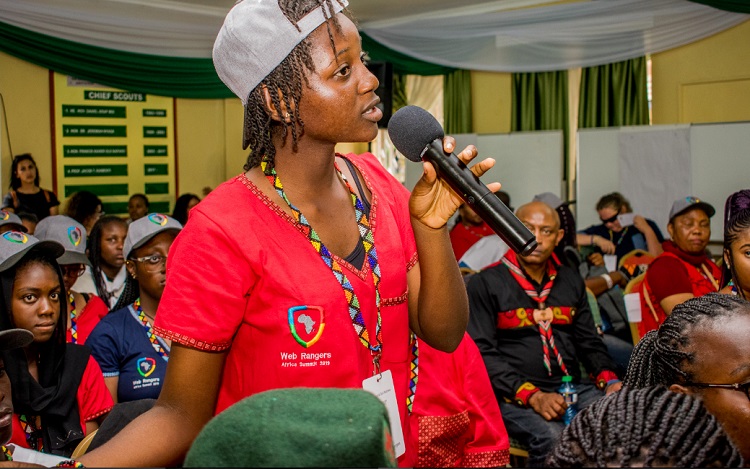
The three-day Web Rangers Africa Summit came to an end in Nairobi on Saturday with organisers seeking to explore new ways of tackling the challenge of online threats against the youth.
The annual Summit, organized by Google and Content Development and Intellectual Property Trust (CODE-IP), a local NGO, in partnership with Kenya Scouts Association, had participants drawn from Kenya, Nigeria and South Africa.
Alex Gakuru, the executive director of Content Development and Intellectual Property Trust (CODE-IP), said that each of the three countries had 4 students attending the summit – that is 2 boys and 2 girls – all accompanied by two teachers per country.
Web Rangers is Google’s online safety program for teenagers aimed to empower them to become ambassadors of safe and responsible use of the internet. Founded in Israel, it has since grown and currently has chapters in Kenya, Nigeria, South Africa, Philippines, India, Turkey, New Zealand, Japan, Argentina, Mexico, Colombia and Czech Republic.
Also attending the Web Rangers Africa Summit were government officials from all the three countries. In Kenya, there was representation from the Kenya Institute of Curriculum Development (KICD), Kenya Film Classification Board (KFCB) which has partnered with Google on a new programme targeting parents; the Communications Authority of Kenya (CA), the Ministry of ICT as well as other private sector and NGO representatives.
As a build-up to the Summit, which opened on Thursday November 21, 2019, CODE-IP and Google ran another programme from September 25, 2019 up to November 8, 2019 called Google Online Safety Roadshow which was a fast-tracked five-week training on online safety throughout the country.
On Friday November 22, 2019, the Summit attendees paid a visit to the Rowallan Camp in Nairobi, the headquarters of the Kenya Scouts Association, a key partner in the programme as it is called the Kenya Scouts Web Rangers. The visit was meant to provide an opportunity for the visitors to learn how the programme is being run practically.
The Kenya Scouts Association is the top youth movement in Africa and the sixth in the whole with a membership of over 2 million.
Through the tour to the Rowallan Camp, the summit organisers sought to achieve a number of results.
“One is how successful it can be to spread the message about online safety using the scouting model as we have done in Kenya; share data on the success we have achieved, and finally, we sought to practically demonstrate the value system which the Scouts follow resembles the values which Web Rangers advocate for. The value-based society and the values which the Kenya Web Rangers stands for is the same as those of the Kenya Scouts, so there’s a natural blend,” said Gakuru. “Another thing we sought to do is to showcase some these achievements we’ve had.”
Google also ran a session which involved activities related to Critical Thinking meant to spur the youth deeply analyze things and situations instead of just taking them at face value, this involves interrogating situations before you react. The Critical Thinking programme was piloted during the tour to the Rowallan Camp and had participation from all the youth in attendance with guidance from the senior members of their teams.”
The Critical Thinking programme is expected to help change how children look at things and make them more inquisitive while also helping them to interrogate situations in an in depth manner.
Gakuru added that the Critical Thinking programme is even more crucial at this time when people are constantly dealing with the issue of Fake News as it can enable the youth to be more discerning about the stuff they come across online, enabling them to step back and avoid being duped (or even hurt). It is also aimed to help the youth in their online interactions as well as reactions.
Michael Murungi, Government Affairs and Public Policy lead at Google said that the Critical Thinking programme is meant to help Web Rangers and those participating in the programme to learn how to apply critical thinking when faced with conflicting situations online.
“It’s meant to help them distinguish between disinformation and information that is accurate and generally be able to deal with threats online. So we think that the opportunity to apply critical thinking in dealing with threats online maybe a very wonderful and fitting chapter for Web Rangers. This is how we’d like to take Web Rangers to the next level,” said Murungi.
Follow us on Telegram, Twitter, Facebook, or subscribe to our weekly newsletter to ensure you don’t miss out on any future updates.




